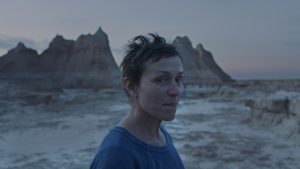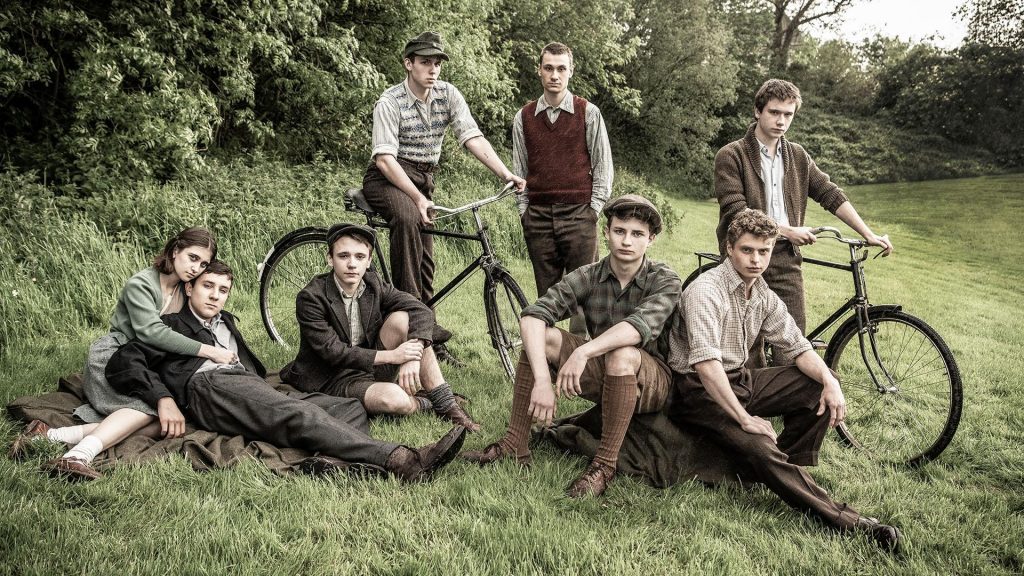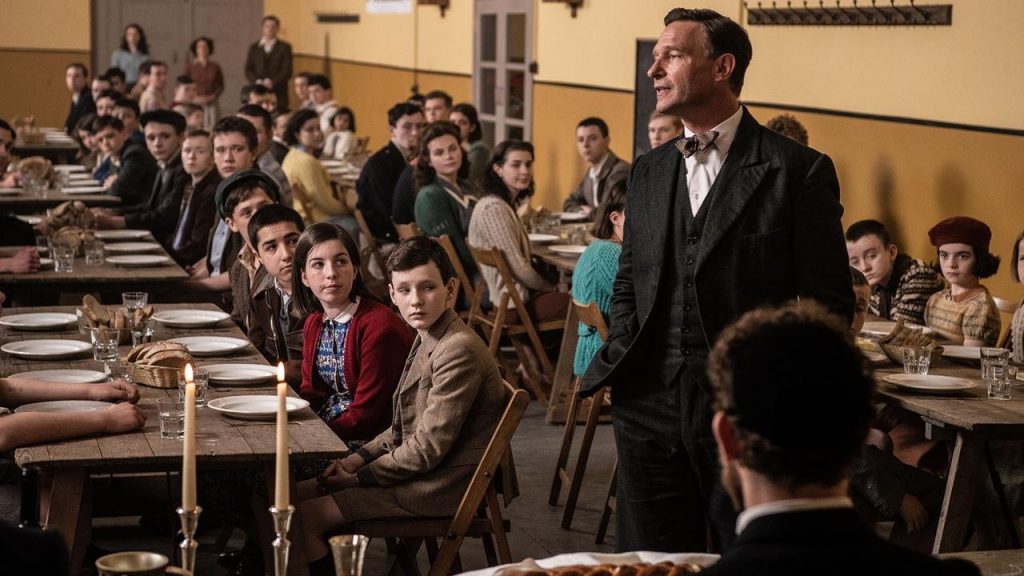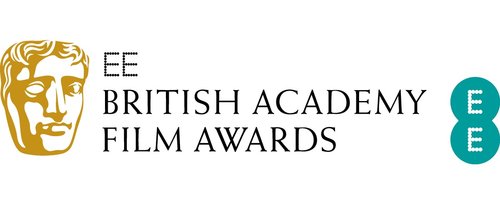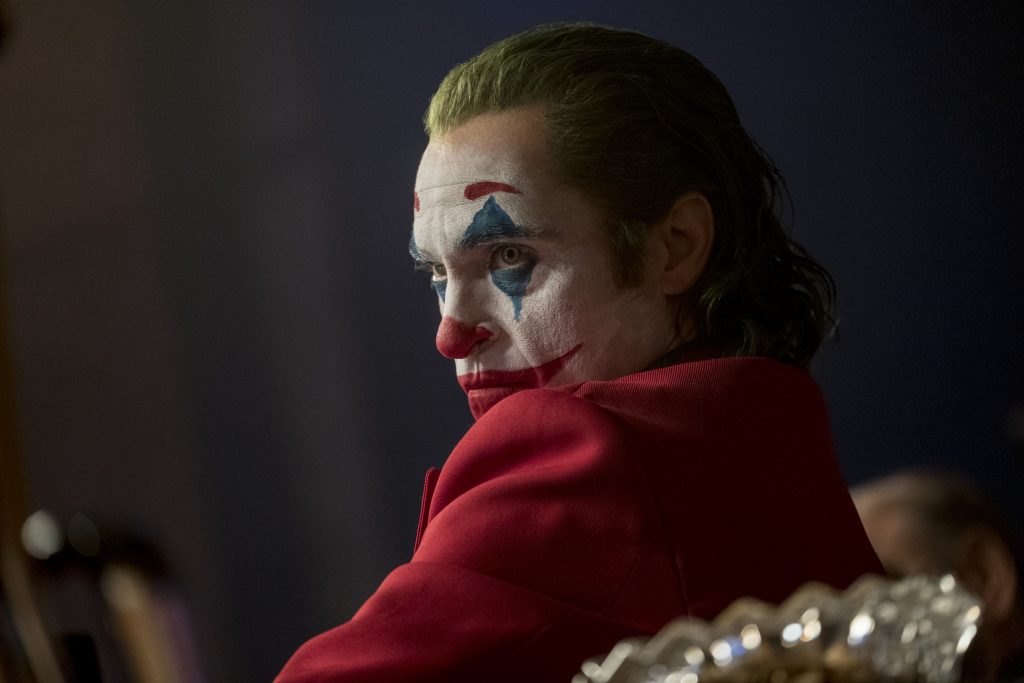March 9, 2021
by Carla Hay
With seven nominations each, the dramatic films “Nomadland” and “Rocks” are the top nominees for the 74th Annual EE British Academy of Film and Television Arts (BAFTA) Awards. Because of the coronavirus pandemic, the show will be a virtual ceremony held at Royal Albert Hall in London. The show will also be split between two broadcasts on April 10 and April 11, 2021. BBC televises the show in the United Kingdom, and BBC America televises the show in the United States.
The April 10 broadcast (on BBC Two in the U.K.) will be for technical categories, such as editing and production design. The April 11 broadcast (on BBC One in the U.K.) will be for the more high-profile categories, such as all the actor/actress categories, Best Director, Best Film and Outstanding British Film. The host for the 2021 BAFTA ceremony is to be announced. Eligible films were those released in the United Kingdom in 2020 or January and February 2021.
Searchlight Pictures’ “Nomadland”(directed by Chloé Zhao and starring Frances McDormand) and Altitude Film Entertainment’s “Rocks” (directed by Sarah Gavron and staring Bukky Bakray) are nominees in the categories of Best Director and Best Actress. In addition, “Nomadland” is nominated for Best Film, while “Rocks” is a contender for Outstanding British Film. “Nomadland” is about an American widow named Fern (played by McDormand), who lives in her van and travels to look for work. “Rocks” (which does not have a U.S. distributor, as of this writing) is about a black British teenage girl named Rocks (played by Bakray), who has to care for her younger brother when their single mother goes missing.
Other movies with several BAFTA nominations include Sony Picture Classics’ “The Father,” Netflix’s “Mank,” A24’s “Minari” and Focus Features’ “Promising Young Woman,” with six nominations each. Netflix’s “The Dig” and STX’s “The Mauritanian” earned five nods each.
Snubs and Surprises
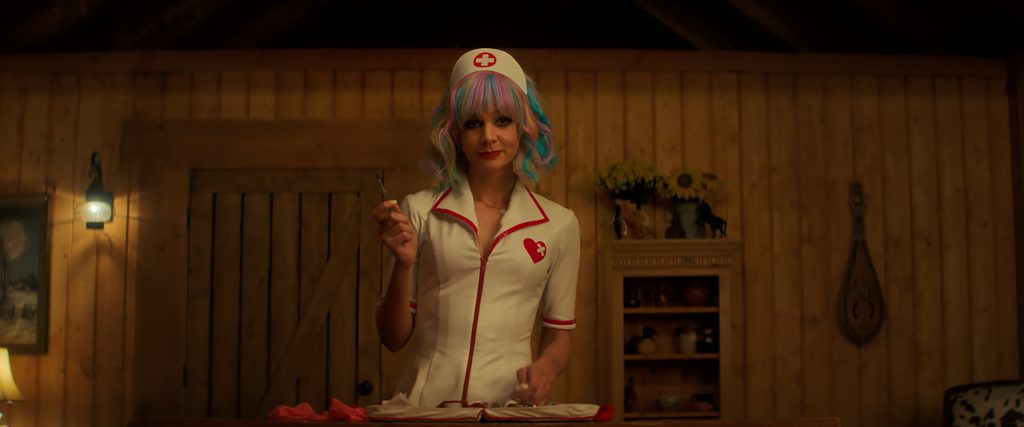
Although “Promising Young Woman” is one of the most-nominated films of the 2021 BAFTAs, the movie failed to get nominations for categories where it has been getting nominated at many other award shows. BAFTA nomination snubs include Best Actress for “Promising Young Woman” star Carey Mulligan and Best Director for writer/director Emerald Fennell, who did get a BAFTA nomination for Best Original Screenplay. “Promising Young Woman” is Fennell’s feature-film debut as a writer and director, but she was also snubbed in the BAFTA category of Outstanding Debut by a British Writer, Director or Producer.
Also getting overlooked for a BAFTA Best Actress nomination was Viola Davis for the Netflix drama “Ma Rainey’s Black Bottom.” Davis has been getting nominated for “Ma Rainey’s Black Bottom” at every major movie award ceremony except the BAFTAs. A big BAFTA surprise nomination for Best Actress is Radha Blank for the Netflix comedy “The Forty-Year-Old Version,” which is the only BAFTA nod for the film. Blank has been getting nominations and awards for writing and directing the movie, but not for starring in it.
Movies about African American experiences were overlooked in most of the major BAFTAs categories. “Ma Rainey’s Black Bottom,” Warner Bros. Pictures’ “Judas and the Black Messiah,” Amazon’s “One Night in Miami…” and Netflix’s “Da 5 Bloods” were snubbed in the categories for Best Picture, Best Director, Best Adapted Screenplay and Best Original Screenplay. However, each movie did pick up nods in the categories of Best Leading Actor or Best Supporting Actor. Dominique Fishback of “Judas and the Black Messiah” also go a surprise nod for Best Supporting Actress, after being largely snubbed for nominations at other major award shows.
As widely expected, Chadwick Boseman of “Ma Rainey’s Black Bottom” is a nominee in the leading actor category. Supporting actor nods also predictably went to Daniel Kaluuya of “Judas and the Black Messiah” and Leslie Odom Jr. for “One Night in Miami…,” because they’ve been getting these nominations at other major award shows. Clarke Peters of “Da 5 Bloods” has been mostly overlooked at major award shows, but he got a Best Supporting Actor nod for the movie. Meanwhile, “Da 5 Bloods” co-star Delroy Lindo, who was widely predicted to be nominated for Best Leading Actor, was shut out of the list of nominees. (Kingsley Ben-Adir of “One Night in Miami…” is a nominee for the Rising Star Award, which is an award for an individual’s career achievements, not for one movie or TV show.)
The Netflix horror movie “His House” also received surprise nominations (three nods), even though it’s being completely snubbed at many other major award shows for movies. “His House,” the feature-film debut of Remi Weekes, is about two South Sudanese refugee spouses who have immigrated to England and find out that their house is haunted. “His House” is nominated for Outstanding British Film; Best Leading Actress (for Wunmi Mosaku); and Outstanding Debut by a British Writer, Director or Producer.
In the Best Documentary category, documentaries that have been racking up awards elsewhere were snubbed for BAFTA nominations. Missing out on BAFTA nods were Amazon’s “Time,” Netflix’s “Crip Camp” and Netflix’s “Dick Johnson Is Dead.” Instead, the movies that made the BAFTA nominee list for Best Documentary are Magnolia Pictures’ “Collective,” Netflix’s “David Attenborough: Life on Our Planet,” Briarcliff Entertainment’s “The Dissident,” Netflix’s “My Octopus Teacher” and Netflix’s “The Social Dilemma.”
Diversity and Inclusion

After getting a lot of backlash and criticism in 2020 for nominating only white people in the actor/actress categories that year, the BAFTAs took major steps toward improving their diversity and inclusion initiatives. These measures included inviting 1,000 new members from underrepresented groups (the British Academy of Film and Television Arts currently has about 6,700 voting members) and expanding the number of Outstanding British Film nominees from five to 10. In addition, members underwent training about unconscious bias.
To address the complaint that films starring underrepresented groups were not seen by enough voting members, the BAFTAs now have a rule that BAFTA juries narrow down the potential nominees to a longlist for each category, and all voting members are required to watch all the films on the longlist in categories for which they are eligible to vote. BAFTA deputy chair Pippa Harris told Variety that there are “no quotas in place” and “these are not nominations that were designed in any way.”
The results are a much more diverse lineup of nominees in almost all the major categories. For the first time in BAFTA history, white men are not the majority of the nominees for Best Director, and women are the majority (four out of six) of the nominees in the category in 2021. The nominees are the aforementioned Gavron and Zhao, along with Thomas Vinterburg for “Another Round,” Lee Isaac Chung for “Minari,” Shannon Murphy for “Babyteeth” and Jasmila Žbanić for “Quo Vadis Aida?”
In addition, in each of the categories for actors and actresses, people of color are the majority (four out of six) of the nominees. All of the people of color who are nominated in the acting categories are either black or Asian, but there are none of Hispanic/Latino ethnicity. For all BAFTA categories, “Minari” (a drama about a Korean family who moves to Arkansas) has the most overall representation for Asian nominees, while “Rocks” has the most representation for black nominees.
The few Hispanic/Latino people who received BAFTA nominations this year are in behind-the-scenes categories: producer Sergio Diaz of “Nomadland” for Best Picture; producer Carlos Cortés of “Sound of Metal” for Best Picture; Sergio Lopez-Rivera of “Ma Rainey’s Black Bottom” for Best Hair and Makeup; and Colomo Martinez of Disney+’s “The One and Only Ivan” for Best Visual Effects. Shudder’s Guatemalan horror film “La Llorona” was snubbed in the category of Best Film Not in the English Language, even though the movie has been getting nominated at other awards shows that have categories for international films or films that are not in the English language.
The LGBTQ community is largely underrepresented, since there are no actors or actresses nominated for BAFTA Awards this year for portraying members of the LGBTQ community. Possible contenders could have been Davis as lesbian singer Ma Rainey in “Ma Rainey’s Black Bottom” or Andra Day for her portrayal of bisexual singer Billie Holiday in Hulu’s “The United States of Billie Holiday.” The disabled community is represented mainly with Amazon’s “Sound of Metal,” about a heavy-metal musician who becomes deaf. “Sound of Metal” is nominated for Best Leading Actor (for Riz Ahmed); Best Supporting Actor (for Paul Raci, who is deaf in real life); Best Editing; and Best Sound.
Here is the complete list of nominations for the 2021 BAFTA Film Awards:
Best Film
“The Father”
“The Mauritanian”
“Nomadland”
“Promising Young Woman”
“The Trial of the Chicago 7”
Outstanding British Film
“Calm With Horses”
“The Dig”
“The Father”
“His House”
“Limbo”
“The Mauritanian”
“Mogul Mowgli”
“Promising Young Woman”
“Rocks”
“Saint Maud”
Best Director
Lee Isaac Chung (“Minari”)
Sarah Gavron (“Rocks”)
Shannon Murphy (“Babyteeth”)
Thomas Vinterberg (“Another Round”)
Jasmila Žbanić (“Quo Vadis, Aida?”)
Chloé Zhao (“Nomadland”)
Best Leading Actor
Riz Ahmed (“Sound of Metal”)
Chadwick Boseman (“Ma Rainey’s Black Bottom”)
Adarsh Gourav (“The White Tiger”)
Anthony Hopkins (“The Father”)
Mads Mikkelsen (“Another Round”)
Tahar Rahim (“The Mauritanian”)
Best Leading Actress
Bukky Bakray (“Rocks”)
Radha Blank (“The Forty-Year-Old Version”)
Frances McDormand (“Nomadland”)
Vanessa Kirby (“Pieces of a Woman”)
Wunmi Mosaku (“His House”)
Alfre Woodard (“Clemency”)
Best Supporting Actor
Daniel Kaluuya (“Judas and the Black Messiah”)
Barry Keoghan (“Calm With Horses”)
Alan Kim (“Minari”)
Leslie Odom Jr. (“One Night In Miami…”)
Clarke Peters (“Da 5 Bloods”)
Paul Raci (“Sound of Metal”)
Best Supporting Actress
Niamh Algar (“Calm With Horses”)
Kosar Ali (“Rocks”)
Maria Bakalova (“Borat Subsequent Moviefilm”)
Dominique Fishback (“Judas and the Black Messiah”)
Ashley Madekwe (“County Lines”)
Yuh-Jung Youn (“Minari”)
Best Adapted Screenplay
Moira Buffini (“The Dig”)
Christopher Hampton, Florian Zeller (“The Father”)
Rory Haines, Sohrab Noshirvani, M.B. Traven (“The Mauritanian”)
Chloé Zhao (“Nomadland”)
Ramin Bahrani (“The White Tiger”)
Best Original Screenplay
Tobias Lindholm and Thomas Vinterberg (“Another Round”)
Jack Fincher (“Mank”)
Emerald Fennell (“Promising Young Woman”)
Theresa Ikoko and Claire Wilson (“Rocks”)
Aaron Sorkin (“The Trial of the Chicago 7”)
Outstanding Debut by a British Writer, Director or Producer
Remi Weekes (“His House”)
Ben Sharrock, Irune Gurtubai (“Limbo”)
Jack Sidey (“Moffie”)
Theresa Ikoko, Claire Wilson (“Rocks”)
Rose Glass, Oliver Kassman (“Saint Maud”)
Best Original Score
Trent Reznor, Atticus Ross (“Mank”)
Emile Mosseri (“Minari”)
James Newton Howard (“News of the World”)
Anthony Willis (“Promising Young Woman”)
Jon Batiste, Trent Reznor, Atticus Ross (“Soul”)
Best Cinematography
Sean Bobbitt (“Judas and the Black Messiah”)
Erik Messerschmidt (“Mank”)
Alwin H. Küchler (“The Mauritanian”)
Dariusz Wolski (“News of the World”)
Joshua James Richards (“Nomadland”)
Best Film Not in the English Language
Thomas Vinterberg, Sisse Graum Jørgensen (“Another Round”)
Andrei Konchalovsky, Alisher Usmanov (“Dear Comrades!”)
Ladj Ly (“Les Misérables”)
Lee Isaac Chung, Christina Oh (“Minari”)
Jasmila Žbanić, Damir Ibrahimovich (“Quo Vadis, Aida?”)
Best Documentary
Alexander Nanau (“Collective”)
Alastair Fothergill, Jonnie Hughes, Keith Scholey (“David Attenborough: A Life on Our Planet”)
Bryan Fogel, Thor Halvorssen (“The Dissident”)
Pippa Ehrlich, James Reed, Craig Foster (“My Octopus Teacher”)
Jeff Orlowski, Larissa Rhodes (“The Social Dilemma”)
Best Animated Film
Dan Scanlon, Kori Rae (“Onward”)
Pete Docter, Dana Murray (“Soul”)
Tomm Moore, Ross Stewart, Paul Young (“Wolfwalkers”)
Best Casting
Shaheen Baig (“Calm with Horses”)
Alexa L. Fogel (“Judas and the Black Messiah”)
Julia Kim (“Minari”)
Lindsay Graham Ahanonu, Mary Vernieu (“Promising Young Woman”)
Lucy Pardee (“Rocks”)
Best Production Design
Maria Djurkovic, Tatiana Macdonald (“The Dig”)
Peter Francis, Cathy Featherstone (“The Father”)
Donald Graham Burt, Jan Pascale (“Mank”)
David Crank, Elizabeth Keenan (“News of the World”)
Sarah Greenwood, Katie Spencer (“Rebecca”)
Best Costume Design
Michael O’Connor (“Ammonite”)
Alice Babidge (“The Dig”)
Alexandra Byrne (“Emma”)
Trish Summerville (“Mank”)
Ann Roth (“Ma Rainey’s Black Bottom”)
Best Make Up and Hair
Jenny Shircore (“The Dig”)
Patricia Dehaney, Eryn Krueger Mekash, Matthew Mungle (“Hillbilly Elegy”)
Matiki Anoff, Larry M. Cherry, Sergio Lopez-Rivera, Mia Neal (“Ma Rainey’s Black Bottom”)
Kimberley Spiteri, Gigi Williams (“Mank”)
Mark Coulier (“Pinocchio”)
Best Editing
Yorgos Lamprinos (“The Father”)
Chloé Zhao (“Nomadland”)
Frédéric Thoraval (“Promising Young Woman”)
Mikkel E.G. Nielsen (“Sound of Metal”)
Alan Baumgarten (“The Trial of the Chicago 7”)
Best Sound
Nominees TBD (“Greyhound”)
Michael Fentum, William Miller, Mike Prestwood Smith, John Pritchett, Oliver Tarney (“News of the World”) Sergio Diaz, Zach Seivers, M. Wolf Snyder (“Nomadland”)
Coya Elliott, Ren Klyce, David Parker (“Soul”)
Jaime Baksht, Nicolas Becker, Phillip Bladh, Carlos Cortés, Michelle Couttolenc (“Sound of Metal”)
Best Visual Effects
Pete Bebb, Nathan McGuinness, Sebastian von Overheidt (“Greyhound”)
Matt Kasmir, Chris Lawrence, David Watkins (“The Midnight Sky”)
Sean Faden, Steve Ingram, Anders Langlands, Seth Maury (“Mulan”)
Santiago Colomo Martinez, Nick Davis, Greg Fisher (“The One and Only Ivan”)
Scott Fisher, Andrew Jackson, Andrew Lockley (“Tenet”)
Best British Short Animation
Renaldho Pelle, Yanling Wang, Kerry Jade Kolbe (“The Fire Next Time”)
Mole Hill, Laura Duncalf (“The Owl and the Pussycat”)
Daniel Quirke, Jamie MacDonald, Brid Arnstein (“The Song of a Lost Boy”)
Best British Short Film
Jesse Lewis Reece, Ike Newman (“Eyelash”)
Akinola Davies, Rachel Dargavel, Wale Davies (“Lizard”)
John Addis, Rami Sarras Pantoja (“Lucky Break”)
Ghada Eldemellawy (“Miss Curvy”)
Farah Nabulsi (“The Present”)
EE Rising Star Award (public vote)
Bukky Bakray
Kingsley Ben-Adir
Morfydd Clark
Ṣọpẹ Dìrísù
Conrad Khan

